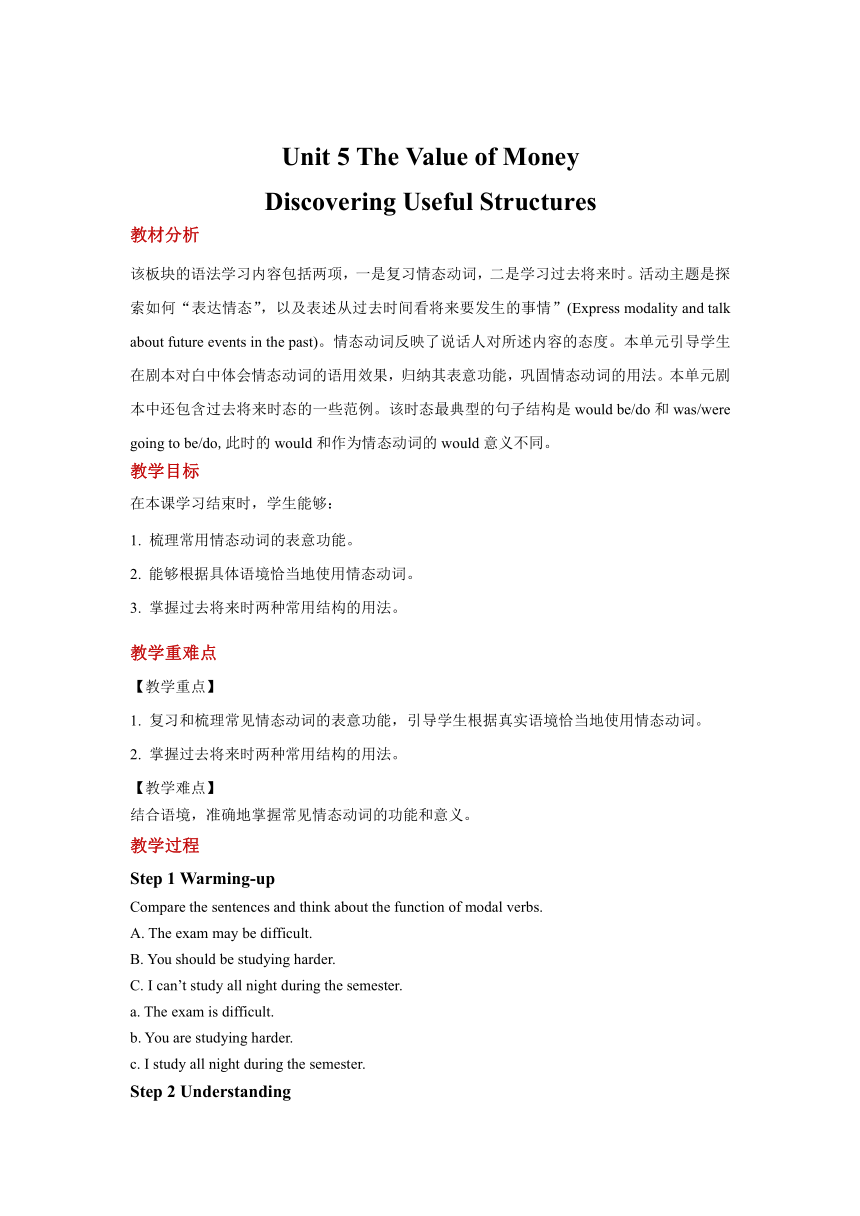人教版(2019)必修第三册Unit 5 The Value of Money Discovering Useful Structures 教学设计
文档属性
| 名称 | 人教版(2019)必修第三册Unit 5 The Value of Money Discovering Useful Structures 教学设计 |

|
|
| 格式 | docx | ||
| 文件大小 | 340.9KB | ||
| 资源类型 | 教案 | ||
| 版本资源 | 人教版(2019) | ||
| 科目 | 英语 | ||
| 更新时间 | 2024-05-04 00:00:00 | ||
图片预览

文档简介
Unit 5 The Value of Money
Discovering Useful Structures
教材分析
该板块的语法学习内容包括两项,一是复习情态动词,二是学习过去将来时。活动主题是探索如何“表达情态”,以及表述从过去时间看将来要发生的事情”(Express modality and talk about future events in the past)。情态动词反映了说话人对所述内容的态度。本单元引导学生在剧本对白中体会情态动词的语用效果,归纳其表意功能,巩固情态动词的用法。本单元剧本中还包含过去将来时态的一些范例。该时态最典型的句子结构是would be/do和was/were going to be/do,此时的would和作为情态动词的would意义不同。
教学目标
在本课学习结束时,学生能够:
1. 梳理常用情态动词的表意功能。
2. 能够根据具体语境恰当地使用情态动词。
3. 掌握过去将来时两种常用结构的用法。
教学重难点
【教学重点】
复习和梳理常见情态动词的表意功能,引导学生根据真实语境恰当地使用情态动词。
2. 掌握过去将来时两种常用结构的用法。
【教学难点】
结合语境,准确地掌握常见情态动词的功能和意义。
教学过程
Step 1 Warming-up
Compare the sentences and think about the function of modal verbs.
A. The exam may be difficult.
B. You should be studying harder.
C. I can’t study all night during the semester.
a. The exam is difficult.
b. You are studying harder.
c. I study all night during the semester.
Step 2 Understanding
Modal verbs have many functions, including the following (A-F). Find modal verbs in previous sections and discuss their functions.
A necessity B possibility C obligation D request E advice F intention
We can discuss it now.
You must do it at once.
Would you please pass me the salt
You needn’t have stayed.
You ought to help him.
I would rather do it myself.
设计意图:通过分析句子,分析情态动词的表意功能。
Step 3 Grammar summary
1. 基本特征
在形式上,情态动词没有实义动词的变化,只有can/will/have to/may等几个有过去式,其他情态动词如must/ought to等的过去式都与现在式同形。
2. 否定形式及缩略形式
3. 主要表意功能
设计意图:总结情态动词的规律,深度掌握情态动词的用法。
Step 4 Understanding
Read the sentences below and think of differences between “was/were going to be/do” and “would be/do”.
1. We thought it was going to rain but it was a beautiful day.
2. I was going to tell him, but he didn’t give me a chance.
3. The children were going to play football when it began to rain.
4. He said he was going to see the match but it was cancelled.
5. He said he would be there at 8 o’clock and so he will.
6. They told me that they probably would not grow corn the next year.
7. She burnt the letters so that her sister would never read them.
8. When my parents went on business trips, my grandparents would look after me.
Step 5 Grammar summary
was/were going to be/do:表示过去计划、安排要做的事
表示说话人根据当时的迹象推断即将发生的事;
表示过去的打算或计划,但因外界干扰而中断,常有but出现;
多用于非正式场合或口语中。
would be/do:表示过去将要发生的事
表示愿意或承诺要做的事;
表示过去某个时期常见的情况或习惯性的动作;
除用于口语外,多用于正式场合或书面语中;
设计意图:引导学生比较两种过去将来时结构的用法。
Step 6 Practice
1. Read the passage and fill in the blanks with suitable modal verbs in the box.
设计意图:引导学生选择恰当的情态动词完成语篇,建构意义。
2. Work on Activity 3. Both “would do” and “was/were going to do” can be used to talk about future events or intentions in the plete the following sentences that describe the future using either form of the given verbs.
3. Complete the sentences with would, was/were going to, and the words in brackets.
设计意图:引导学生在练习中掌握would和was/were going to的区别。
4. Work on Activity 4. Work in pairs. Discuss the scene from The Million Pound Bank Note on page 52 and share your understanding of the story. Use modal verbs when necessary. The example below may help you.
设计意图:引导学生在真实语境下口头交流阅读剧本的体会。
Step 7 Assignment
Finish Exercise 2 & 3 on page 87.
设计意图:通过练习,巩固所学的知识。
Discovering Useful Structures
教材分析
该板块的语法学习内容包括两项,一是复习情态动词,二是学习过去将来时。活动主题是探索如何“表达情态”,以及表述从过去时间看将来要发生的事情”(Express modality and talk about future events in the past)。情态动词反映了说话人对所述内容的态度。本单元引导学生在剧本对白中体会情态动词的语用效果,归纳其表意功能,巩固情态动词的用法。本单元剧本中还包含过去将来时态的一些范例。该时态最典型的句子结构是would be/do和was/were going to be/do,此时的would和作为情态动词的would意义不同。
教学目标
在本课学习结束时,学生能够:
1. 梳理常用情态动词的表意功能。
2. 能够根据具体语境恰当地使用情态动词。
3. 掌握过去将来时两种常用结构的用法。
教学重难点
【教学重点】
复习和梳理常见情态动词的表意功能,引导学生根据真实语境恰当地使用情态动词。
2. 掌握过去将来时两种常用结构的用法。
【教学难点】
结合语境,准确地掌握常见情态动词的功能和意义。
教学过程
Step 1 Warming-up
Compare the sentences and think about the function of modal verbs.
A. The exam may be difficult.
B. You should be studying harder.
C. I can’t study all night during the semester.
a. The exam is difficult.
b. You are studying harder.
c. I study all night during the semester.
Step 2 Understanding
Modal verbs have many functions, including the following (A-F). Find modal verbs in previous sections and discuss their functions.
A necessity B possibility C obligation D request E advice F intention
We can discuss it now.
You must do it at once.
Would you please pass me the salt
You needn’t have stayed.
You ought to help him.
I would rather do it myself.
设计意图:通过分析句子,分析情态动词的表意功能。
Step 3 Grammar summary
1. 基本特征
在形式上,情态动词没有实义动词的变化,只有can/will/have to/may等几个有过去式,其他情态动词如must/ought to等的过去式都与现在式同形。
2. 否定形式及缩略形式
3. 主要表意功能
设计意图:总结情态动词的规律,深度掌握情态动词的用法。
Step 4 Understanding
Read the sentences below and think of differences between “was/were going to be/do” and “would be/do”.
1. We thought it was going to rain but it was a beautiful day.
2. I was going to tell him, but he didn’t give me a chance.
3. The children were going to play football when it began to rain.
4. He said he was going to see the match but it was cancelled.
5. He said he would be there at 8 o’clock and so he will.
6. They told me that they probably would not grow corn the next year.
7. She burnt the letters so that her sister would never read them.
8. When my parents went on business trips, my grandparents would look after me.
Step 5 Grammar summary
was/were going to be/do:表示过去计划、安排要做的事
表示说话人根据当时的迹象推断即将发生的事;
表示过去的打算或计划,但因外界干扰而中断,常有but出现;
多用于非正式场合或口语中。
would be/do:表示过去将要发生的事
表示愿意或承诺要做的事;
表示过去某个时期常见的情况或习惯性的动作;
除用于口语外,多用于正式场合或书面语中;
设计意图:引导学生比较两种过去将来时结构的用法。
Step 6 Practice
1. Read the passage and fill in the blanks with suitable modal verbs in the box.
设计意图:引导学生选择恰当的情态动词完成语篇,建构意义。
2. Work on Activity 3. Both “would do” and “was/were going to do” can be used to talk about future events or intentions in the plete the following sentences that describe the future using either form of the given verbs.
3. Complete the sentences with would, was/were going to, and the words in brackets.
设计意图:引导学生在练习中掌握would和was/were going to的区别。
4. Work on Activity 4. Work in pairs. Discuss the scene from The Million Pound Bank Note on page 52 and share your understanding of the story. Use modal verbs when necessary. The example below may help you.
设计意图:引导学生在真实语境下口头交流阅读剧本的体会。
Step 7 Assignment
Finish Exercise 2 & 3 on page 87.
设计意图:通过练习,巩固所学的知识。
